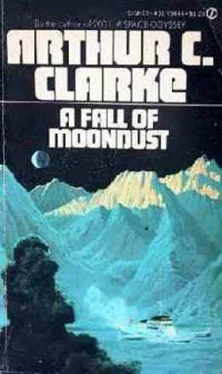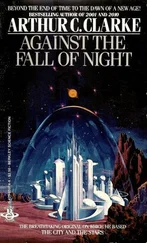Arthur Clarke - A Fall of Moondust
Здесь есть возможность читать онлайн «Arthur Clarke - A Fall of Moondust» весь текст электронной книги совершенно бесплатно (целиком полную версию без сокращений). В некоторых случаях можно слушать аудио, скачать через торрент в формате fb2 и присутствует краткое содержание. Жанр: Фантастика и фэнтези, на английском языке. Описание произведения, (предисловие) а так же отзывы посетителей доступны на портале библиотеки ЛибКат.
- Название:A Fall of Moondust
- Автор:
- Жанр:
- Год:неизвестен
- ISBN:нет данных
- Рейтинг книги:5 / 5. Голосов: 1
-
Избранное:Добавить в избранное
- Отзывы:
-
Ваша оценка:
- 100
- 1
- 2
- 3
- 4
- 5
A Fall of Moondust: краткое содержание, описание и аннотация
Предлагаем к чтению аннотацию, описание, краткое содержание или предисловие (зависит от того, что написал сам автор книги «A Fall of Moondust»). Если вы не нашли необходимую информацию о книге — напишите в комментариях, мы постараемся отыскать её.
A Fall of Moondust — читать онлайн бесплатно полную книгу (весь текст) целиком
Ниже представлен текст книги, разбитый по страницам. Система сохранения места последней прочитанной страницы, позволяет с удобством читать онлайн бесплатно книгу «A Fall of Moondust», без необходимости каждый раз заново искать на чём Вы остановились. Поставьте закладку, и сможете в любой момент перейти на страницу, на которой закончили чтение.
Интервал:
Закладка:
A glance at the dials was enough to show Lawrence the trouble. The air pipes — both of them — were no longer connected to Selene. The purifier was pumping oxygen into the Sea through one pipe and, worse still, sucking in dust through the other. Lawrence wondered how long it would take to clean out the filters, but wasted no further time upon that thought. He was too busy calling Selene.
There was no answer. He tried all the cruiser's frequencies, without receiving even a whisper of a carrier wave. The Sea of Thirst was as silent to radio as it was to sound.
They're finished, he said to himself; it's all over. It was a near thing, but we just couldn't make it. And all we needed was another hour.
What could have happened? he thought dully. Perhaps the hull had collapsed under the weight of the dust. No — that was very unlikely; the internal air pressure would have prevented that. It must have been another subsidence. He was not sure, but he thought that there had been a slight tremor underfoot. From the beginning he had been aware of this danger, but could see no way of guarding against it. This was a gamble they had all taken, and Selene had lost.
Even as Selene started to fall, something told Pat that this was quite different from the first cave-in. It was much slower, and there were scrunching, squishing noises from outside the hull which, even in that desperate moment, struck Pat as being unlike any sounds that dust could possibly make.
Overhead, the oxygen pipes were tearing loose. They were not sliding out smoothly, for the cruiser was going down stern first, tilting toward the rear. With a crack of splintering Fiberglas, the pipe just ahead of the air-lock galley ripped through the roof and vanished from sight. Immediately, a thick jet of dust sprayed into the cabin, and fanned out in a choking cloud where it hit the floor.
Commodore Hansteen was nearest, and got there first. Tearing off his shirt, he swiftly wadded it into a ball and rammed it into the aperture. The dust spurted in all directions as he struggled to block the flow. He had almost succeeded when the forward pipe ripped loose — and the main lights went out as, for the second time, the cable conduit was wrenched away.
“I'll take it!” shouted Pat. A moment later, also shirtless, he was trying to stem the torrent pouring in through the hole.
He had sailed the Sea of Thirst a hundred times, yet never before had he touched its substance with his naked skin. The gray powder sprayed into his nose and eyes, half choking and wholly blinding him. Though it was as bone dry as the dust from a Pharaoh's tomb — dryer than this, indeed, for it was a million times older than the pyramids — it had a curiously soapy feeling. As he fought against it, Pat found himself thinking: If there is one death worse than being drowned, it's being buried alive.
When the jet weakened to a thin trickle, he knew that he had avoided that fate — for the moment. The pressure produced by fifteen meters of dust, under the low lunar gravity, was not difficult to overcome-though it would have been another story if the holes in the roof had been much larger.
Pat shook the dust from his head and shoulders, and cautiously opened his eyes. At least he could see again; thank heaven for the emergency lighting, dim though it was. The Commodore had already plugged his leak, and was now calmly sprinkling water from a paper cup to lay the dust. The technique was remarkably effective, and the few remaining clouds quickly collapsed into patches of mud.
Hansteen looked up and caught Pat's eye.
“Well, Captain”, he said. “Any theories?”
There were times, thought Pat, when the Commodore's Olympian self-control was almost maddening. He would like to see him break, just once. No — that was not really true. His feeling was merely a flash of envy, even of jealousy — understandable, but quite unworthy of him. He should be ashamed of it, and he was.
“I don't know what's happened”, he said. “Perhaps the people on top can tell us.”
It was an uphill walk to the pilot's position, for the cruiser was now tilted at about thirty degrees from the horizontal. As Pat took his seat in front of the radio, he felt a kind of despairing numbness that surpassed anything he had known since their original entombment. It was a sense of resignation, an almost superstitious belief that the gods were fighting against them, and that further struggle was useless.
He felt sure of this when he switched on the radio and found that it was completely dead. The power was off; when that oxygen pipe had ripped out the roof cable conduit, it had done a thorough job.
Pat swiveled slowly around in his seat. Twenty-one men and women were looking at him, awaiting his news. But twenty of them he did not see, for Sue was watching him, and he was conscious only of the expression on her face. It held an anxiety and readiness — but, even now, no hint of fear. As Pat looked at her, his own feelings of despair seemed to dissolve. He felt a surge of strength, even of hope.
“I'm damned if I know what's happened”, he said. “But I'm sure of this — we're not done for yet, by several light-years. We may have sunk a little farther, but our friends on the raft will soon catch up with us. This will mean a slight delay — that's all. There's certainly nothing to worry about.”
“I don't want to be an alarmist, Captain”, said Barrett, “but suppose the raft has sunk as well? What then?”
“We'll know as soon as I get the radio fixed”, replied Pat, glancing anxiously at the wires dangling from the roof cable duct. “And until I get this spaghetti sorted out, you'll have to put up with the emergency lighting.”
“I don't mind”, said Mrs. Schuster. “I think it's rather cute.”
Bless you, Mrs. S., said Pat to himself. He glanced quickly around the cabin; though it was hard to see all their expressions in this dim lighting, the passengers seemed calm enough.
They were not quite so calm a minute later; that was all the time it took to discover that nothing could be done to repair the lights or radio. The wiring had been ripped out far down inside the conduit, beyond reach of the simple tools available here.
“This is rather more serious”, reported Pat. “We won't be able to communicate, unless they lower a microphone to make contact with us.”
“That means”, said Barrett, who seemed to like looking on the dark side of things, “that they've lost touch with us. They won't understand why we're not answering. Suppose they assume that we're all dead — and abandon the whole operation?”
The thought had flashed through Pat's mind, but he had dismissed it almost at once.
“You've heard Chief Engineer Lawrence on the radio”, he answered. “He's not the sort of man who'd give up until he had absolute proof that we're no longer alive. You needn't worry on that score.”
“What about our air?” asked Professor Jayawardene anxiously. “We're back on our own resources again.”
“That should last for several hours, now the absorbers have been regenerated. Those pipes will be in place before then”, answered Pat, with slightly more confidence than he felt. “Meanwhile, we'll have to be patient and provide our own entertainment again. We did it for three days; we should be able to manage for a couple of hours.”
He glanced again around the cabin, looking for any signs of disagreement, and saw that one of the passengers was rising slowly to his feet. It was the very last person he would have expected — quiet little Mr. Radley, who had uttered perhaps a dozen words during the entire trip.
Pat still knew no more about him than that he was an accountant, and come from New Zealand — the only country on Earth still slightly isolated from the rest of the world, by virtue of its position. It could be reached, of course, as quickly as any other spot on the planet, but it was the end of the line, not a way station to somewhere else. As a result, the New Zealanders still proudly preserved much of their individuality. They claimed, with a good deal of truth, to have salvaged all that was left of English culture, now that the British Isles had been absorbed into the Atlantic Community.
Читать дальшеИнтервал:
Закладка:
Похожие книги на «A Fall of Moondust»
Представляем Вашему вниманию похожие книги на «A Fall of Moondust» списком для выбора. Мы отобрали схожую по названию и смыслу литературу в надежде предоставить читателям больше вариантов отыскать новые, интересные, ещё непрочитанные произведения.
Обсуждение, отзывы о книге «A Fall of Moondust» и просто собственные мнения читателей. Оставьте ваши комментарии, напишите, что Вы думаете о произведении, его смысле или главных героях. Укажите что конкретно понравилось, а что нет, и почему Вы так считаете.












